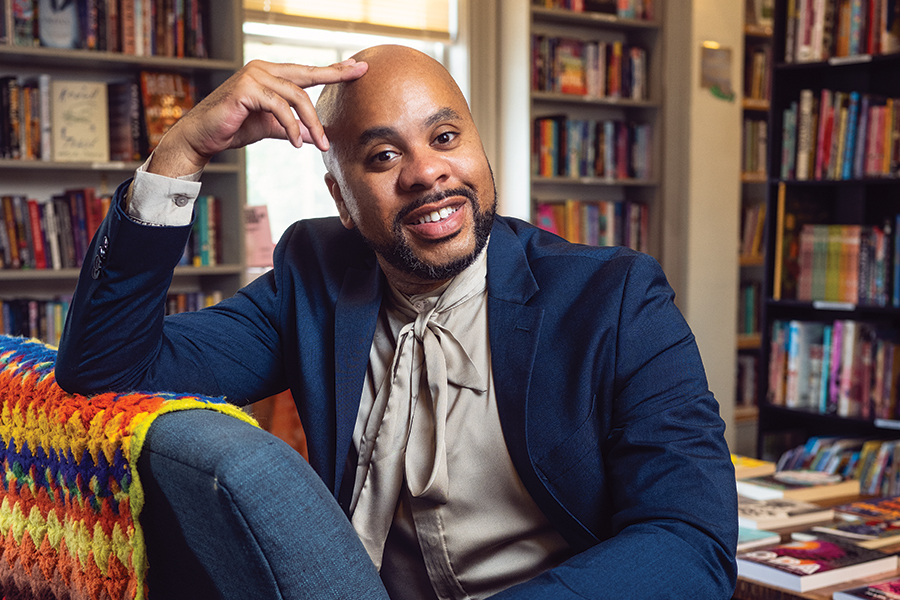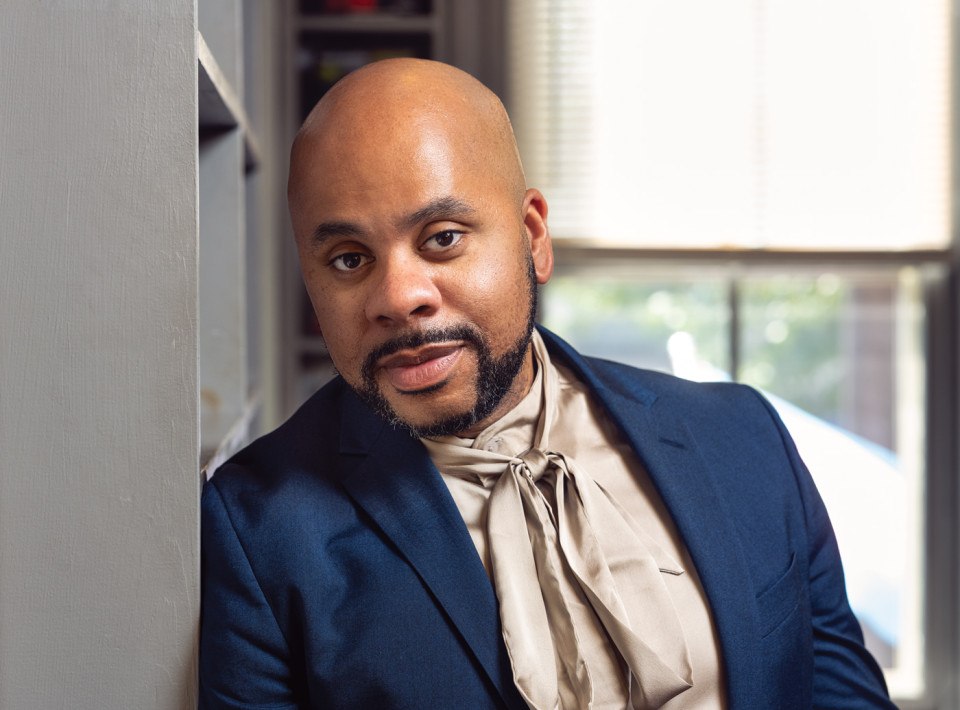What Qualifies This South Philly Guy to Give Out Advice Nationwide?
We asked newly syndicated advice columnist R. Eric Thomas that exact question — and what it's like being married to a man of the cloth.

Nationally syndicated advice columnist R. Eric Thomas, who lives in South Philadelphia / Photograph by Kyle Kielinski
The 2020 debut book by local author R. Eric Thomas caught the attention of Hamilton creator Lin-Manuel Miranda; since then, he has written for TV and released one play and three more books. And he just took a job as a syndicated newspaper advice columnist, reaching millions of people nationwide through outlets like the Washington Post and Chicago Tribune. Here, he explains why he’s poised to solve your problems and what it’s like being married to a man of the cloth.
Hi, Eric. I love a good advice column. So I was thrilled to hear that you were taking over the syndicated column once penned by none other than Ann Landers. What question are you asked the most in “Asking Eric”?
What I’m asked the most is not actually an advice question but a question about the job itself. I’m asked: What qualifies you to give advice?
Fair.
I understand where the question is coming from, and while I may not be an expert in one subject or another, I can be a general expert. But really what it comes down to is that I am empathetic. What also qualifies me to give advice is that I have made a lot of mistakes in my life. I’ve stepped in my own — oh, I shouldn’t use that phrase — I’ve, I’ve … I’ve gotten in my own way a lot and then had to learn how to get out of my own way.
I first met you in the 2000s, when you were performing in storytelling slams at Philly clubs.
That’s right! Telling those stories really changed my life. Doing live storytelling in front of a crowd, that’s how I learned about narrative and narrative propulsion, which are really useful in everything from stand-up comedy to novel writing. You learn a lot when you have to keep the interest of the audience. You learn where the “heat” is in the story.
Explain.
Nobody is going to give you an opportunity to sit in front of 300 people and read your entire novel and see how they would respond. There’s not an opportunity to read your half-hour comedy pilot in front of people and get feedback. So when you have several minutes to tell a story live, that’s where you find out what gets people. You find the heat of the story.
You mentioned stand-up comedy. Have you ventured into that territory at all? It terrifies me.
I cannot crack that art form. Yes, I’ve done stand-up now and then. But I just don’t like it. There is, of course, an expectation that you’re gonna be funny. I mean, that’s the deal. I much prefer to have an audience come into a space and have the expectation of We’re going to hear stories and maybe laugh and maybe cry. And I love to surprise them. I also can’t memorize a joke to save my life. I could have a great joke, but I get to the punchline and forget what I’m supposed to say.
That’s no good.
Yeah, so don’t book me to do stand-up. But I’m great on a podcast, and I just celebrated 10 years of hosting the storytelling nights at World Cafe Live the first Tuesday of each month.
I’ve seen you tell more than a few stories there.
And those stories became my first book, Here for It, which came out in February 2020.

R. Eric Thomas at TEDxPhilly in 2011 / Photograph provided by R. Eric Thomas
Just before the world shut down! You got some impressive praise for that book from none other than Lin-Manuel Miranda. He described you as “one of my favorite writers” and said that Here for It was “like if David Sedaris was completely steeped in pop culture instead of living somewhere far away writing about it.” Ahem! Since then you’ve released an illustrated book about Maxine Waters, a young adult novel, and the memoir Congratulations, the Best Is Over! So you’ve been pretty busy. Any downtime?
I’ve been traveling a lot for my various projects and also was invited to go on an artistic retreat to Provincetown with a bunch of other Philly artists.
I’ve never been, but I’ve heard good things.
It’s one of my favorite places on Earth. It’s creatively generative. The air is great. When I’m there, I feel like a Victorian who has been prescribed sea air. My troubles recede. My sinuses feel wonderful. There’s so much good food, bookstores. You’ve gotta rent a bike. Maybe get a little tattoo. [laughs]
Seems to me there must be a tattoo story waiting for me.
I have recently become obsessed with getting my first tattoo. My friend Chris and I, we consider ourselves to be like Miss Piggy, but different kinds of Miss Piggy. He’s Miss Piggy in the water ballet in The Great Muppet Caper, and I’m Miss Piggy in the makeup-counter scene with Joan Rivers in The Muppets Take Manhattan. Miss Piggy is an icon. Miss Piggy is underappreciated. She’s multilingual. She’s the real star of the Muppets.
Gotta say: No one has ever mentioned Miss Piggy to me before in an interview.
[Laughs] Well, Chris wanted to get a Miss Piggy tattoo, and I offered to take him to do that as a present. And then I thought I might get my own Miss Piggy tattoo. But then another friend, while we were in Provincetown, brought up this idea of dazzling casually. So I thought maybe I should get a tattoo that’s about casual dazzle, and now my brain is working on all these tattoo ideas.
Are you going to do it?
I just came across this poem by Gwendolyn Brooks, and there’s a line that reads: “This is the urgency: Live! and have your blooming in the noise of the whirlwind.” And I immediately thought: Oh, she is telling me to get a tattoo! I’m 43 with perfect skin. Okay, that’s a lie. It’s never been perfect. But I’m 43 with no tattoos. And I could imagine myself at 45, looking very cool with a full sleeve.
I feel like most people who get a bunch of tattoos do so in the first half of their life, but you’re leaning on the second.
You know, when I was younger, I had a lot of tattoo ideas, but I was always afraid of the permanence. I’m also glad I didn’t get some of those tattoos because they either represented a version of myself that I didn’t need to memorialize, or they were just terrible ideas.
Let’s hear the most terrible.
[Laughs] When I was maybe 19, I thought it would be funny to have two Colt .45s in pink running around my clavicles.
Oh my God.
Yeah. I’m not a gun person. Never shot a gun. Don’t like guns. It was an absurd, random idea. I do some writing for the TV series Better Things and mentioned this guns-on-clavicles tattoo to the creator of the show, and she said, Oh, that’s going in the show!
You grew up in Baltimore. How did you wind up here?
I was doing the mid-20s aimless thing, and aimlessness took a co-worker and me up I-95. And I wound up building a life here. I met my now-husband David here. And then I got laid off — I was working for UArts in the dance department — and I started writing a column for Elle. David got offered a job as a pastor of a church in Baltimore, and I realized with the Elle column, I didn’t need to be anywhere in particular to do that. Baltimore just seemed to be where life was moving us.
And yet, Philly demanded your return.
I spent five years in Baltimore, trying to build social connections, interrupted by the pandemic. Two and a half years into the pandemic, we kind of looked at each other and said we need to be in the community in Philadelphia, with people that I had spent years getting to know. David found a job at a church in Swarthmore, which is where he is today.
When you tell people that your husband is a pastor, does the needle suddenly scratch across the record?
I forget that many people don’t meet a lot of pastors. And I definitely see that calculus going on in some people’s heads when I casually drop the fact. Eric doesn’t seem like the wife of a megachurch charlatan.
These days, for people who haven’t met a lot of pastors, it’s so easy to associate the idea of any pastor with the far-right sect of evangelicals.
True. There are awful pastors, but me telling my story also gives people an opportunity to know that there are people of faith who are also liberal and progressive. But I also don’t want to have a soapbox about this. I am exhausted with … there’s a phrase, “I’ve retired from the debate society.” And I have. But I actually think that Christianity is inherently progressive. Jesus was a progressive, whether you think he was just a cool guy or the son of God. He was about distribution of wealth, collapsing societal strata. Jesus was giving out free health care … Oh boy. People will email me about this. People love to educate me on the Bible. Listen, David has a master’s in divinity. If I need to know about Jesus, I’ll just roll over in bed and ask my husband.
If I show up at his church on Sunday, will I find you there?
I don’t go regularly. I do feel very welcome there. And the two other pastors at the church are both women who are married to men. So, actually, all three pastoral spouses are men!
As a pastor, I’m sure David, like you now, is asked for advice all the time. What’s the most recent advice question you’ve responded to?
A woman wrote in about her sister-in-law, who didn’t follow the cocktail attire dress code at the woman’s wedding. This is a very low-stakes kind of question. She thought the sister-in-law had done it on purpose. But this was a wedding in a beach town. At a resort. My approach is, listen, cocktail attire doesn’t mean anything anymore. We’ve lost all that protocol. What is cocktail attire? What is business casual? The answer is everything is, at this point. When you say cocktail attire, do you mean a sundress? Do you mean Bonobos? I told the writer to chill out. Her sister-in-law wore clothes that felt comfortable. Don’t take someone’s open-toed sandals as some disrespectful attack.
When I first started the column, some members of the press asked me about being Black and a gay man, and I thought it was an odd question. I get that both demos are unusual for the space, but I think it’s an asset.” — R. Eric Thomas
Are most of the questions you get of the variety where you just want to tell the writer to relax?
It’s kind of a split. It’s either this is way too small a problem to be this upset about, or this is so great a problem that my heart breaks. But whatever the question is, I will try to take it seriously if you’re that stressed out about it. You may be petty and small, but you actually took the time to write in to an advice column. And some of these people write actual letters! I have a P.O. box in Center City and get letters. So yes, some of it you might roll your eyes at, but there’s probably something underneath this that’s making you stress out so much. We have these 200 words together. We will never speak again. I’m not gonna tell you you’re an idiot.
The advice-column business has been dominated by women. White women. You fit neither demographic.
When I first started the column, some members of the press asked me about being Black and a gay man, and I thought it was an odd question. I didn’t want to answer those questions. Because I’m also a person with a brain. I get that both demos are unusual for the space, but I think it’s an asset. My demographics are also just one part of what makes me human. I’m glad I get to be a full person in the column.

Photograph by Kyle Kielinski
How long until your job is taken over by AI?
I would be surprised if there wasn’t some advice out there being doled out by AI right now, but the voice of each successful advice columnist is so distinctive that you just can’t achieve that with AI. You want to know what the best restaurant with outdoor seating is that is open tonight? Okay, AI might have the answers. But not for My daughter won’t speak to my new husband, and I feel conflicted on who to side with. AI has no idea what to do with that. AI doesn’t understand the different ways of being human.
We can’t end this interview without me asking you for advice. And this is actually a legit life circumstance for me. Dear Eric: My daughter just turned 17 and said she’s going to get a tattoo when she turns 18. I said cool, you’ll be an adult then. My wife said no way. How do I emerge from this battle unscathed?
My answer to you, Victor, is that I think it’s healthy that you’re already in the space where you see your daughter as an autonomous person who will make her own mistakes. That said, when you’re parenting near-adults, it becomes helpful to put out there the sliding-door nature of life. These are your choices. And this is what could happen. Life is not necessarily about avoiding regrets. It’s about right-sizing the decision that we do make. And make absolutely sure you tell her about this guy you know who almost had two pink Colt .45s tattooed on his clavicles when he was about her age!
We’ve edited this interview for length and clarity.


